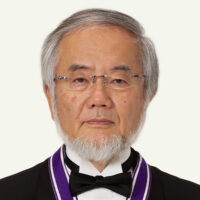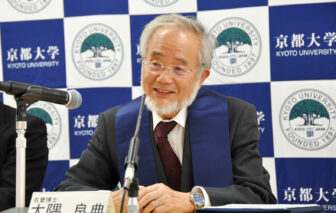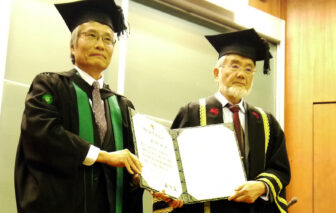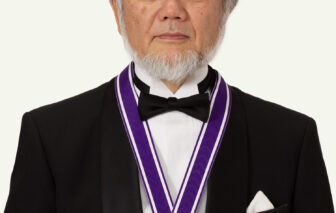
2012 Kyoto Prize Laureates
Life Sciences and Medicine(Molecular Biology, Cell Biology, Systems Biology, etc.)
/ Molecular Cell Biologist
1945 -
Professor, Tokyo Institute of Technology
The World of Autophagy as Seen through Yeast—The Intracellular Recycling System—
2012
11 /11 Sun
Place:Kyoto International Conference Center
50 Years of Autophagy
2012
11 /12 Mon
13:00 - 17:00
Place:Kyoto International Conference Center
Dr. Ohsumi has achieved world-leading results in his genetic study of autophagy in yeast, a cellular process that degrades proteins in order to adapt to the nutritional environment and other factors. He has made groundbreaking contributions toward elucidating of the molecular mechanisms of autophagy and its physiological significance.
*This field then was Field of Life Sciences (Molecular Biology, Cell Biology, Neurobiology).
Dr. Yoshinori Ohsumi has made groundbreaking contributions to science in his cellular genetic study of autophagy (also known as “cellular self-cannibalization”) in yeast, a cellular process that degrades proteins in order to adapt to the nutritional environment and other factors. Autophagy was first proposed in the early 1960s, having been inferred from the observation that cytosolic components such as mitochondria and endoplasmic reticulum are found in single-layered membranes within the lysosome, known as the food vacuole or phagosome in animal cells. The term autophagy refers to a process whereby intracellular components and organelles are incorporated into the lysosome for degradation. For some time, the phenomenon was reported to occur in a variety of cells and some organs, but the molecular mechanism and physiological significance remained unclear. In 1992, while studying the function of vacuoles using the budding yeast, Saccharomyces cerevisiae, Dr. Ohsumi discovered that intracellular components and organelles enclosed by single-layered membranes appeared within the vacuole if proteinase B-deficient strains were exposed to a low-nutrient culture medium. This was the first demonstration that autophagy could be induced in yeast. By following this observation, Dr. Ohsumi then isolated a number of mutants in which autophagy is not induced even if proteases are inhibited and nutrients are depleted. His discovery of autophagy in yeast and these mutants paved the way for analysis of the molecular mechanisms involved in autophagy. Thus far, his findings have led to the identification of several dozen molecules involved in autophagy, and functional analysis of these molecules is shedding light on the pathway determining how the de novo formation of a membrane structure containing intracellular components and organelles, and its fusion with a lysosome, take place in response to starvation and other stimuli.
The discovery of factors involved in the autophagic process in yeast has also helped to identify their homologs in mammalian and other animal cells. This has, in turn, enabled many researchers to reveal the broad physiological significance of autophagy in animals—namely, that autophagy is essential for neonates to adapt to the starvation state at birth; that autophagy is necessary to prevent neural cell death, as it hinders the accumulation of abnormal proteins in nerves; and that metabolic turnover via autophagy is vital to the maintenance of myocardial contraction.
Dr. Ohsumi’s contributions to this field deserve high recognition, as he has opened the door to elucidating the molecular mechanisms and physiological significance of autophagy—a cellular self-cannibalization system that represents a vital and fundamental process in living organisms.
For these reasons, the Inamori Foundation is pleased to present the 2012 Kyoto Prize in Basic Sciences to Dr. Yoshinori Ohsumi.
Profile is at the time of the award.

Dr. Yoshinori Ohsumi receives the Honorary Degree of Doctor from Kyoto University!
The presentation ceremony was held at Kyoto University on July 13, 2017 to present the Honorary Degree of Doctor to Dr. Ohsumi.

Dr. Yoshinori Ohsumi granted “Honorary Professor Emeritus” at the University of Tokyo
Dr. Ohsumi was granted the title of honorary professor emeritus at the University of Tokyo; the presentation ceremony was held at Komaba campus on Feb. 22, 2017.

Dr. Yoshinori Ohsumi received Order of Culture
Dr. Ohsumi (Molecular Cell Biologist, the 2012 Kyoto Prize laureate in Basic Sciences) was selected as a recipient of the Order of Culture.